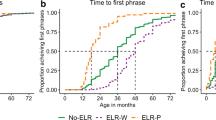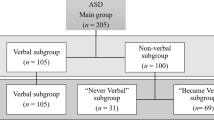Abstract
Longitudinal research on language abilities and social functioning in young children suggests that gains in one domain affect gains in the other. However, few studies have examined inter-relations of language and social functioning jointly among young children diagnosed with autism spectrum disorder (ASD). Pre-verbal toddlers with ASD are a group of particular clinical relevance, given that greater language abilities at school entry have been associated with positive long-term adjustment in many areas, including adaptive and social functioning. Reduced attention to and engagement in social interactions among autistic toddlers who are not yet speaking may interfere with language development concurrently and over time. The present study examined reciprocal associations between language ability and social functioning over a 2-year period across three time points in a sample of 90 pre-verbal autistic toddlers using cross-lagged panel analyses conducted in MPlus. Cross-lagged panel analyses revealed significant within-timepoint synchronous correlations, within-domain autoregressive paths over time, and as hypothesized, reciprocal significance in all cross-lagged paths. For very young pre-verbal children with ASD, language ability and social functioning appear to exert concurrent and cascading developmental influences on one another. Targeting both language and social functioning simultaneously may enhance intervention efficacy for very young pre-verbal children with ASD.



Similar content being viewed by others
References
American Psychiatric Association (APA). (2013). Diagnostic and statistical manual of mental disorders (5th ed.). https://doi.org/10.1176/appi.books.9780890425596
Anderson, D. K., Lord, C., Risi, S., DiLavore, P. S., Shulman, C., Thurm, A., Welch, K., & Pickles, A. (2007). Patterns of growth in verbal abilities among children with autism spectrum disorder. Journal of Consulting and Clinical Psychology, 75(4), 594–604. https://doi.org/10.1037/0022-006X.75.4.594
Anderson, D. K., Oti, R. S., Lord, C., & Welch, K. (2009). Patterns of growth in adaptive social abilities among children with autism spectrum disorders. Journal of Abnormal Child Psychology, 37(7), 1019–1034. https://doi.org/10.1007/s10802-009-9326-0
Baghdadli, A., Assouline, B., Sonié, S., Pernon, E., Darrou, C., Michelon, C., Picot, M.-C., Aussilloux, C., & Pry, R. (2012). Developmental trajectories of adaptive behaviors from early childhood to adolescence in a cohort of 152 children with autism spectrum disorders. Journal of Autism and Developmental Disorders, 42(7), 1314–1325. https://doi.org/10.1007/s10803-011-1357-z
Baghdadli, A., Rattaz, C., Michelon, C., Pernon, E., & Munir, K. (2019). Fifteen-year prospective follow-up study of adult outcomes of autism spectrum disorders among children attending centers in five regional departments in France: The EpiTED cohort. Journal of Autism and Developmental Disorders, 49(6), 2243–2256. https://doi.org/10.1007/s10803-019-03901-9
Barnett, M. A., Gustafsson, H., Deng, M., Mills-Koonce, W. R., & Cox, M. (2012). Bidirectional associations among sensitive parenting, language development, and social competence. Infant and Child Development, 21(4), 374–393. https://doi.org/10.1002/icd.1750
Bennett, T. A., Szatmari, P., Georgiades, K., Hanna, S., Janus, M., Georgiades, S., Hanna, S., Janus, M., Georgiades, S., Duku, E., Bryson, S., Fombonne, E., Smith, I. M., Mirenda, P., Volden, J., Waddell, C., Roberts, W., Vaillancourt, T., Zwaigenbaum, L., … The Pathways in ASD Study Team. (2015). Do reciprocal associations exist between social and language pathways in preschoolers with autism spectrum disorders? Journal of Child Psychology and Psychiatry, 56(8), 874–883. https://doi.org/10.1111/jcpp.12356
Ben-Sasson, A., Soto, T. W., Martínez-Pedraza, F., & Carter, A. S. (2013). Early sensory over-responsivity in toddlers with autism spectrum disorders as a predictor of family impairment and parenting stress. Journal of Child Psychology and Psychiatry, 54(8), 846–853. https://doi.org/10.1111/jcpp.12035
Bilaver, L. A., Sobotka, S. A., & Mandell, D. S. (2021). Understanding racial and ethnic disparities in autism-related service use among Medicaid-enrolled children. Journal of Autism and Developmental Disorders, 51(9), 3341–3355. https://doi.org/10.1007/s10803-020-04797-6
Billstedt, E., Carina Gillberg, I., & Gillberg, C. (2007). Autism in adults: Symptom patterns and early childhood predictors. Use of the DISCO in a community sample followed from childhood. Journal of Child Psychology and Psychiatry, 48(11), 1102–1110. https://doi.org/10.1111/j.1469-7610.2007.01774.x
Bradshaw, J., Schwichtenberg, A. J., & Iverson, J. M. (2022). Capturing the complexity of autism: Applying a developmental cascades framework. Child Development Perspectives, 16(1), 18–26. https://doi.org/10.1111/cdep.12439
Bruyneel, E., Demurie, E., Warreyn, P., Beyers, W., Boterberg, S., Bontinck, C., Dewaele, N., & Roeyers, H. (2019). Language growth in very young siblings at risk for autism spectrum disorder. International Journal of Language & Communication Disorders, 54(6), 940–953. https://doi.org/10.1111/1460-6984.12497
Chen, H. Y., & Little, R. (1999). A test of missing completely at random for generalized estimating equations with missing data. Biometrika, 86(1), 1–13. https://doi.org/10.1093/biomet/86.1.1
Chevallier, C., Kohls, G., Troiani, V., Brodkin, E. S., & Schultz, R. T. (2012). The social motivation theory of autism. Trends in Cognitive Sciences, 16(4), 231–239. https://doi.org/10.1016/j.tics.2012.02.007
Cisneros-Franco, J. M., Voss, P., Thomas, M. E., & de Villers-Sidani, E. (2020). Critical periods of brain development. In Handbook of Clinical Neurology (Vol. 173, pp. 75–88). Elsevier. https://doi.org/10.1016/B978-0-444-64150-2.00009-5
Dawson, G., Toth, K., Abbott, R., Osterling, J., Munson, J., Estes, A., & Liaw, J. (2004). Early social attention impairments in autism: Social orienting, joint attention, and attention to distress. Developmental Psychology, 40(2), 271–283. https://doi.org/10.1037/0012-1649.40.2.271
DiStefano, C., Shih, W., Kaiser, A., Landa, R., & Kasari, C. (2016). Communication growth in minimally verbal children with ASD: The importance of interaction. Autism Research, 9(10), 1093–1102. https://doi.org/10.1002/aur.1594
Farmer, C., Swineford, L., Swedo, S. E., & Thurm, A. (2018). Classifying and characterizing the development of adaptive behavior in a naturalistic longitudinal study of young children with autism. Journal of Neurodevelopmental Disorders, 10(1), 1–9. https://doi.org/10.1186/s11689-017-9222-9
Fenson, L., Marchman, V., & Thal, D. (1993). MacArthur-bates communicative development inventories: Words and sentences form MCDI. Paul H. Brookes Publishing Company.
Fountain, C., Winter, A. S., & Bearman, P. S. (2012). Six developmental trajectories characterize children with autism. Pediatrics, 129(5), e1112–e1120. https://doi.org/10.1542/peds.2011-1601
Goods, K. S., Ishijima, E., Chang, Y. C., & Kasari, C. (2013). Preschool based JASPER intervention in minimally verbal children with autism: Pilot RCT. Journal of Autism and Developmental Disorders, 43(5), 1050–1056. https://doi.org/10.1007/s10803-012-1644-3
Hartshorne, J. K., Tenenbaum, J. B., & Pinker, S. (2018). A critical period for second language acquisition: Evidence from 2/3 million English speakers. Cognition, 177, 263–277. https://doi.org/10.1016/j.cognition.2018.04.007
Hoff, E. (2006). How social contexts support and shape language development. Developmental Review, 26(1), 55–88. https://doi.org/10.1016/j.dr.2005.11.002
Hooper, D., Coughlan, J., & Mullen, M. R. (2008). Structural equation modelling: Guidelines for determining model fit. Electronic Journal of Business Research Methods, 6(1), 53–60.
Howlin, P., Moss, P., Savage, S., & Rutter, M. (2013). Social outcomes in mid-to later adulthood among individuals diagnosed with autism and average nonverbal IQ as children. Journal of the American Academy of Child & Adolescent Psychiatry, 52(6), 572–581. https://doi.org/10.1016/j.jaac.2013.02.017
Iverson, J. M. (2021). Developmental variability and developmental cascades: Lessons from motor and language development in infancy. Current Directions in Psychological Science, 30(3), 228–235. https://doi.org/10.1177/0963721421993822
Jones, E. J., Gliga, T., Bedford, R., Charman, T., & Johnson, M. H. (2014). Developmental pathways to autism: A review of prospective studies of infants at risk. Neuroscience & Biobehavioral Reviews, 39, 1–33. https://doi.org/10.1016/j.neubiorev.2013.12.001
Kasari, C., Gulsrud, A., Freeman, S., Paparella, T., & Hellemann, G. (2012). Longitudinal follow-up of children with autism receiving targeted interventions on joint attention and play. Journal of the American Academy of Child & Adolescent Psychiatry, 51(5), 487–495. https://doi.org/10.1016/j.jaac.2012.02.019
Kasari, C., Paparella, T., Freeman, S., & Jahromi, L. B. (2008). Language outcome in autism: Randomized comparison of joint attention and play interventions. Journal of Consulting and Clinical Psychology, 76(1), 125–137. https://doi.org/10.1037/0022-006X.76.1.125
Koegel, R. L., Shirotova, L., & Koegel, L. K. (2009). Brief report: Using individualized orienting cues to facilitate first-word acquisition in non-responders with autism. Journal of Autism and Developmental Disorders, 39(11), 1587–1592. https://doi.org/10.1007/s10803-009-0765-9
Landa, R. J., Gross, A. L., Stuart, E. A., & Faherty, A. (2013). Developmental trajectories in children with and without autism spectrum disorders: The first 3 years. Child Development, 84(2), 429–442. https://doi.org/10.1111/j.1467-8624.2012.01870.x
Landa, R. J., Reetzke, R., Tahseen, M., & Hess, C. R. (2020). Early behavioral profiles elucidating vulnerability and resiliency to later ASD outcomes. Development and Psychopathology, 32(4), 1217–1229. https://doi.org/10.1017/S0954579420000814
Little, R. J. A. (1988). A test of missing completely at random for multivariate data with missing values. Journal of the American Statistical Association, 83(404), 1198–1202.
Little, T. D., Jorgensen, T. D., Lang, K. M., & Moore, E. W. G. (2013). On the joys of missing data. Journal of Pediatric Psychology, 39(2), 151–162. https://doi.org/10.1093/jpepsy/jst048
Little, T. D., Preacher, K. J., Selig, J. P., & Card, N. A. (2007). New developments in latent variable panel analyses of longitudinal data. International Journal of Behavioral Development, 31(4), 357–365. https://doi.org/10.1177/0165025407077757
Lord, C., Risi, S., Lambrecht, L., Cook, E. H., Jr., Leventhal, B. L., DiLavore, P. C., Pickles, A., & Rutter, M. (2000). The Autism Diagnostic Observation Schedule—Generic: A standard measure of social and communication deficits associated with the spectrum of autism. Journal of Autism and Developmental Disorders, 30(3), 205–223. https://doi.org/10.1023/A:1005592401947
Luyster, R. J., Kadlec, M. B., Carter, A. S., & Tager-Flusberg, H. (2008). Language assessment and development in toddlers with autism spectrum disorders. Journal of Autism and Developmental Disorders, 38(8), 1426–1438. https://doi.org/10.1007/s10803-007-0510-1
Magiati, I., Tay, X. W., & Howlin, P. (2014). Cognitive, language, social and behavioural outcomes in adults with autism spectrum disorders: A systematic review of longitudinal follow-up studies in adulthood. Clinical Psychology Review, 34(1), 73–86. https://doi.org/10.1016/j.cpr.2013.11.002
Masten, A. S., & Cicchetti, D. (2010). Developmental cascades. Development and Psychopathology, 22(3), 491–495. https://doi.org/10.1017/S0954579410000222
Mitchell, S., Brian, J., Zwaigenbaum, L., Roberts, W., Szatmari, P., Smith, I., & Bryson, S. (2006). Early language and communication development of infants later diagnosed with autism spectrum disorder. Journal of Developmental & Behavioral Pediatrics, 27(2), S69–S78.
Mullen, E. M. (1995). Mullen scales of early learning (pp. 58–64). AGS.
Mundy, P. (2018). A review of joint attention and social-cognitive brain systems in typical development and autism spectrum disorder. European Journal of Neuroscience, 47(6), 497–514. https://doi.org/10.1111/ejn.13720
Muthén, L. K., & Muthén, B. O. (2012). Mplus user’s guide (6th ed.). Muthén & Muthén.
O’Dell, L., Bertilsdotter Rosqvist, H., Ortega, F., Brownlow, C., & Orsini, M. (2016). Critical autism studies: Exploring epistemic dialogues and intersections, challenging dominant understandings of autism. Disability & Society, 31(2), 166–179. https://doi.org/10.1080/09687599.2016.1164026
Ozonoff, S., & Iosif, A. M. (2019). Changing conceptualizations of regression: What prospective studies reveal about the onset of autism spectrum disorder. Neuroscience & Biobehavioral Reviews, 100, 296–304. https://doi.org/10.1016/j.neubiorev.2019.03.012
Ozonoff, S., Iosif, A. M., Baguio, F., Cook, I. C., Hill, M. M., Hutman, T., Rogers, S., Rozga, A., Sangha, S., Sigman, M., & Steinfeld, M. B. (2010). A prospective study of the emergence of early behavioral signs of autism. Journal of the American Academy of Child & Adolescent Psychiatry, 49(3), 256–266. https://doi.org/10.1016/j.jaac.2009.11.009
Ozonoff, S., Young, G. S., Landa, R. J., Brian, J., Bryson, S., Charman, T., Chawarska, K., Macari, S., Messinger, D., Stone, W., Zwaigenbaum, L., & Iosif, A. M. (2015). Diagnostic stability in young children at risk for autism spectrum disorder: A baby siblings research consortium study. Journal of Child Psychology and Psychiatry, 56(9), 988–998. https://doi.org/10.1111/jcpp.12421
Paterson, S. J., Parish-Morris, J., Hirsh-Pasek, K., & Golinkoff, R. M. (2016). Considering development in developmental disorders. Journal of Cognition and Development, 17(4), 568–583. https://doi.org/10.1080/15248372.2016.1200047
Pickles, A., Anderson, D. K., & Lord, C. (2014). Heterogeneity and plasticity in the development of language: A 17-year follow-up of children referred early for possible autism. Journal of Child Psychology and Psychiatry, 55(12), 1354–1362. https://doi.org/10.1111/jcpp.12269
Rogers, S. J., & Dawson, G. (2010). Early Start Denver Model for young children with autism: Promoting language, learning, and engagement. The Guilford Press.
Rutter, M., Le Couteur, A., & Lord, C. (2003). Autism diagnostic interview-revised. Western Psychological Services, p. 30.
Sacrey, L. A. R., Zwaigenbaum, L., Bryson, S., Brian, J., Smith, I. M., Raza, S., Roberts, W., Szatmari, P., Vaillancourt, T., Roncadin, C., & Garon, N. (2019). Developmental trajectories of adaptive behavior in autism spectrum disorder: A high-risk sibling cohort. Journal of Child Psychology and Psychiatry, 60(6), 697–706. https://doi.org/10.1111/jcpp.12985
Schreibman, L., & Stahmer, A. C. (2014). A randomized trial comparison of the effects of verbal and pictorial naturalistic communication strategies on spoken language for young children with autism. Journal of Autism and Developmental Disorders, 44(5), 1244–1251. https://doi.org/10.1007/s10803-013-1972-y
Sparrow, S. S., Balla, D. A., & Cicchetti, D. V. (1984). Vineland adaptive behavior scales. American Guidance Service Inc.
Tager‐Flusberg, H., & Kasari, C. (2013). Minimally verbal school‐aged children with autism spectrum disorder: The neglected end of the spectrum. Autism research, 6(6), 468–478. https://doi.org/10.1002/aur.1329
Tanner, A., & Dounavi, K. (2021). The emergence of autism symptoms prior to 18 months of age: A systematic literature review. Journal of Autism and Developmental Disorders, 51(3), 973–993. https://doi.org/10.1007/s10803-020-04618-w
Thomas, M. S. C. (2016). Understanding delay in developmental disorders. Child Development Perspectives, 10(2), 73–80. https://doi.org/10.1111/cdep.12169
Thurm, A., Manwaring, S. S., Swineford, L., & Farmer, C. (2015). Longitudinal study of symptom severity and language in minimally verbal children with autism. Journal of Child Psychology and Psychiatry, 56(1), 97–104. https://doi.org/10.1111/jcpp.12285
Whalen, C., Schreibman, L., & Ingersoll, B. (2006). The collateral effects of joint attention training on social initiations, positive affect, imitation, and spontaneous speech for young children with autism. Journal of Autism and Developmental Disorders, 36(5), 655–664. https://doi.org/10.1007/s10803-006-0108-z
Wiggins, L. D., Durkin, M., Esler, A., Lee, L. C., Zahorodny, W., Rice, C., Yeargin-Allsopp, M., Dowling, N. F., Hall-Lande, J., Morrier, M. J., Christensen, D., Shenouda, J., & Baio, J. (2020). Disparities in documented diagnoses of autism spectrum disorder based on demographic, individual, and service factors. Autism Research, 13(3), 464–473. https://doi.org/10.1002/aur.2255
Wodka, E. L., Mathy, P., & Kalb, L. (2013). Predictors of phrase and fluent speech in children with autism and severe language delay. Pediatrics, 131(4), e1128–e1134. https://doi.org/10.1542/peds.2012-2221
Zimmerman, F. J., Gilkerson, J., Richards, J. A., Christakis, D. A., Xu, D., Gray, S., & Yapanel, U. (2009). Teaching by listening: The importance of adult-child conversations to language development. Pediatrics, 124(1), 342–349. https://doi.org/10.1542/peds.2008-2267
Zwaigenbaum, L., Bryson, S. E., Brian, J., Smith, I. M., Roberts, W., Szatmari, P., Roncadin, C., Garon, N., & Vaillancourt, T. (2015). Stability of diagnostic assessment for autism spectrum disorder between 18 and 36 months in a high-risk cohort. Autism Research, 9(7), 790–800. https://doi.org/10.1002/aur.1585
Acknowledgments
This research was conducted as part of the Studies to Advance Autism Research and Treatment (STAART) center at Boston University. We thank the STAART Center staff for their dedicated work on this project. We are particularly grateful to the families of the children in this study, whose participation in our project inspires this work and makes it possible. The first author thanks the members of her master’s thesis committee, Drs. Alice S. Carter, Abbey Eisenhower, and Laurel Wainwright, for their feedback and support of this manuscript.
Funding
Funding was provided by National Institute of Mental Health Grant U54 MH 66398 (Helen Tager-Flusberg, Center Principal Investigator, Alice S. Carter, Project Principal Investigator) as well as the National Institutes of Health grant U19 DC 03610 (Helen Tager-Flusberg, Center Principal Investigator, Alice S. Carter, Project Principal Investigator) and the Boston University School of Medicine General Clinical Research Center Grant M01-RR0533.
Author information
Authors and Affiliations
Contributions
Study conceptualization, study design, and data collection were performed by ASC and collaborators. Data analysis was completed by DO and was overseen by ASC. The first draft of the manuscript was written by DO and was subsequently revised for publication by MH. All authors read and approved the final manuscript.
Corresponding author
Ethics declarations
Competing interests
Devon Oosting and Mya Howard do not declare any potential conflicts of interest with respect to the research, authorship, and/or publication of this article. Alice S. Carter has no potential conflicts of interest with respect to the research and authorship of this article. Dr. Carter is an Associate Editor of the Journal of Autism and Developmental Disorders. All authors have no relevant financial interests to disclose.
Additional information
Publisher's Note
Springer Nature remains neutral with regard to jurisdictional claims in published maps and institutional affiliations.
Rights and permissions
Springer Nature or its licensor (e.g. a society or other partner) holds exclusive rights to this article under a publishing agreement with the author(s) or other rightsholder(s); author self-archiving of the accepted manuscript version of this article is solely governed by the terms of such publishing agreement and applicable law.
About this article
Cite this article
Oosting, D.R., Howard, M.S. & Carter, A.S. Reciprocal Associations Between Language Ability and Social Functioning Development in Pre-verbal Autistic Children. J Autism Dev Disord 54, 1643–1655 (2024). https://doi.org/10.1007/s10803-023-05906-x
Accepted:
Published:
Issue Date:
DOI: https://doi.org/10.1007/s10803-023-05906-x




